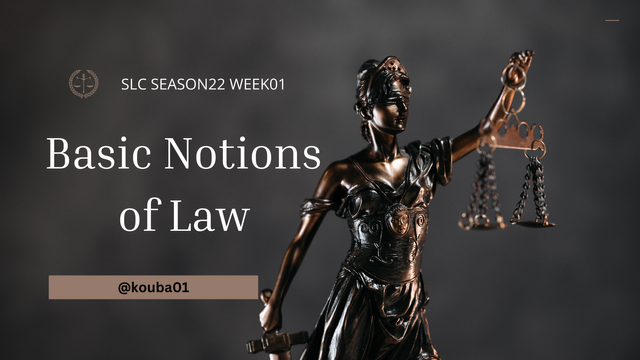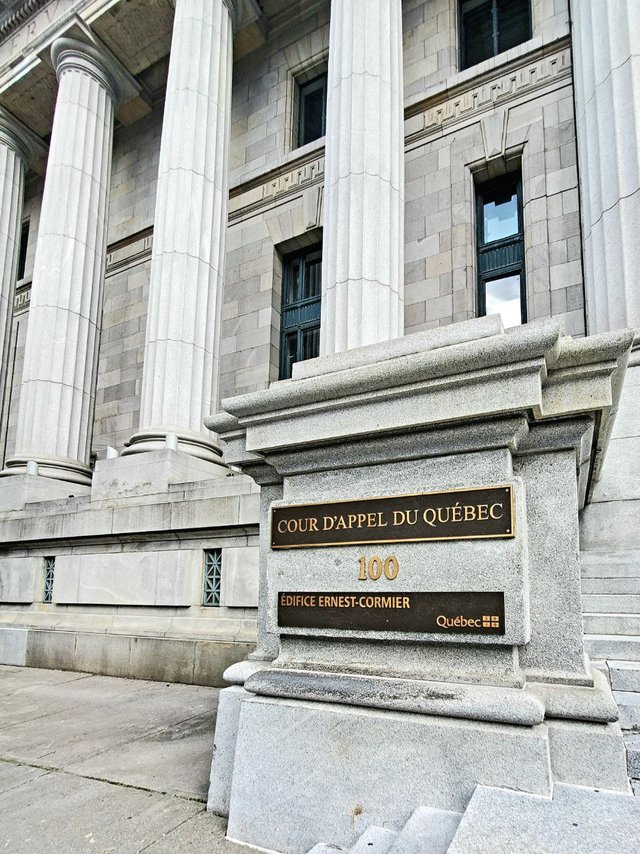SLC22-W1 / Basic Notions of Law

Part I
State in your own words and based on what you explained in class: What is law?
Law is a set of binding rules established by the state to regulate relations between individuals within a society, guarantee peaceful coexistence and achieve justice, law aims to protect rights and define duties and covers various areas of life such as contracts, torts, property and work, in Tunisia, law plays a central role in achieving social stability, as most legislation is based on the Tunisian Constitution, which is considered the supreme authority on legislation.
Consider the explanations given in class, according to the law and the laws of your country. I pointed out two examples of "Objective Law" and two examples of "Subjective Law".
Objective Law
Objective law refers to the set of rules which govern society and are obligatory for all, the State establishes these laws and must be respected whatever individual preferences, in Tunisia, we can cite:
The Tunisian Penal Code: This law defines crimes and corresponding penalties, for example, theft is a criminal offense under Article 260, and violators are subject to legal sanctions regardless of personal circumstances.

The Highway Code: This law imposes mandatory rules on drivers, such as respecting traffic lights and speed limits to ensure road safety, violation of these rules results in sanctions such as fines or license suspension.
Subjective law
Subjective law concerns the rights of individuals as members of society, allowing them to act within the limits of the law according to their decisions or personal interests, in Tunisia, we can cite:
The property right: enshrined in article 41 of the Tunisian Constitution, it allows individuals to own, use and dispose of their property as they wish, provided that this does not contravene public order or to the act.

The Right to Vote: As guaranteed by the Tunisian electoral law, citizens have the right to participate in elections and referendums, this is a personal choice and not an obligation, leaving everyone free to exercise this right or to refrain.
Practical case:
A citizen is driving a vehicle on the road and passes without respecting the traffic light, seconds later he is stopped by a traffic policeman and this citizen claims that he did not respect the traffic light because he was in a hurry to pick up his son and take him to the hospital because he is sick.
State according to what you learned, in which part of the case Objective Law and Subjective Law are present.
In this case, the analysis is split into two parts:
Objective Law: The Tunisian highway code which requires drivers to respect traffic lights within the framework of general binding rules to avoid accidents and protect lives.
Subjective Law: appears in the driver's decision not to respect the red light due to his desire to reach the hospital to save his sick son, this behavior arises from his personal interest and is contrary to respect for public law.
 |  |
|---|
Parte II
Based on what was explained in class, make a comparison and according to the law of your country. Give an example of a law and an example of a rule.
In Tunisia, the law is considered a set of binding rules established by the State to regulate relations within society, guarantee justice and protect rights, what distinguishes the law is that it is registered in an official framework and that it is approved by legislative institutions such as the Assembly of People's Representatives, and that its violation carries legal sanctions which may include fines, imprisonment or financial compensation.
On the other hand, a norm is a set of social or behavioral norms aimed at regulating relations between individuals at an informal level, the rule can be restrictive in certain contexts such as work rules or shared premises, but is often based more on an obligation morality than formal sanctions.
Examples of law in Tunisia:
Personal Status Code: It is considered one of the most important Tunisian laws, as it regulates family relationships, such as marriage, divorce and inheritance, for example, the law states that the marriage contract must be documented by the state for it to be legal, it also specifies the conditions and procedures for divorce and child custody to guarantee the rights of all parties.
Highway Code (Highway Code): It stipulates binding rules for drivers, such as respecting traffic lights and respecting the permitted speed, for example, if a driver exceeds the limit speeding, he is legally fined.
Examples of norms in Tunisia:
Rules for coexistence in shared buildings:
Like setting specific times to throw away garbage or prohibiting the use of the elevator during certain periods, these rules are established by agreement between residents to ensure peaceful coexistence, they are not official laws, but their non-compliance may lead to social conflict.
Regulations for public places: such as banning smoking in enclosed spaces or specifying visiting times for public parks, these rules aim to regulate the behavior of individuals within the framework of respect for others.
Practical case:
Mr. Juan Perez rents an apartment but his financial situation worsens and he has not paid for 3 months. On one occasion, a meeting of apartment owners was held and the owner of the apartment where Mr. Juan Perez lives presents the case to the owners of the other apartments. They take advantage of the opportunity to say that they have received complaints from the neighbors of the building because Mr. Juan Perez has 4 dogs as pets in his apartment, something that is prohibited in the building's rules of coexistence.
Analyze and explain in which part of the case Mr. Juan Perez is violating a law and in which he is violating a rule.
Violation of the law:
In the above scenario, non-payment of rent by Mr. Juan for three consecutive months constitutes a violation of the rental contract between him and the apartment owner, in Tunisia these contracts fall under the provisions of the law on obligations and contracts which explicitly requires tenants to fulfill their financial obligations within the agreed time frame. Non-payment of rent gives the landlord the legal right to take legal action, either to demand eviction or to claim arrears, so that failure to comply with this obligation by Mr. Juan constitutes a legal offense that could give rise to formal legal action against them.
Violation of Norms:
In addition, Mr. Juan's decision to keep four dogs in his apartment contravenes the building's cohabitation rules, these rules, generally established by mutual agreement between the residents of the building, aim to promote conditions of harmonious lives by regulating issues such as the number of animals allowed in order to avoid possible disturbances or health problems, although this behavior does not constitute a violation of the law, it represents a deviation from the rules of conduct socially agreed upon, which resulted in resentment among neighbors and an increase in social tensions within the community.
Parte III
Explain with your own words what importance you have for using the Comparative Direction of agreeing to the visto in class.
The use of comparative law is of particular importance because it broadens our understanding of legal systems by examining how laws operate in different countries and societies, which helps us identify the strengths and weaknesses of our own legal framework while By learning from the successful practices of other jurisdictions to avoid their mistakes, this comparison provides a solid basis for making better informed decisions when developing or reforming laws, drawing inspiration from effective solutions implemented elsewhere while adapting them to the specificities of our own legal and social context.
In the class, taking a comparative approach means recognizing that laws do not operate in isolation, but are deeply influenced by cultural, social and historical factors, thereby analyzing how other countries deal with specific legal challenges, such as whether criminal justice, property rights or employment laws, allows us to better understand the innovative and adapted solutions that we could propose in our own legal system to meet the needs of our society.
For example, when a country is considering reforming its environmental laws, studying the policies adopted by other countries to combat climate change can provide valuable information on what works and what does not, providing insight. unique opportunity for creativity and continuous improvement of the judicial system. For me, law becomes an essential tool for international cooperation and legal progress, fostering a better understanding of the connections between global legal systems and their role in solving the global challenges that human societies face.
Thank you very much for reading, it's time to invite my friends @lil.albab, @miftahulrizky, @heriadi to participate in this contest.
Best Regards,
@kouba01

@tipu curate
;) Holisss...
--
This is a manual curation from the @tipU Curation Project.
Upvoted 👌 (Mana: 0/8) Get profit votes with @tipU :)
Saludos
Es importante tener conocimiento sobre este tema el derecho impuesto por los gobiernos superiores, para mejorar la conducta de las personas
Pero también de conocer el derecho que tenemos como ciudadanos